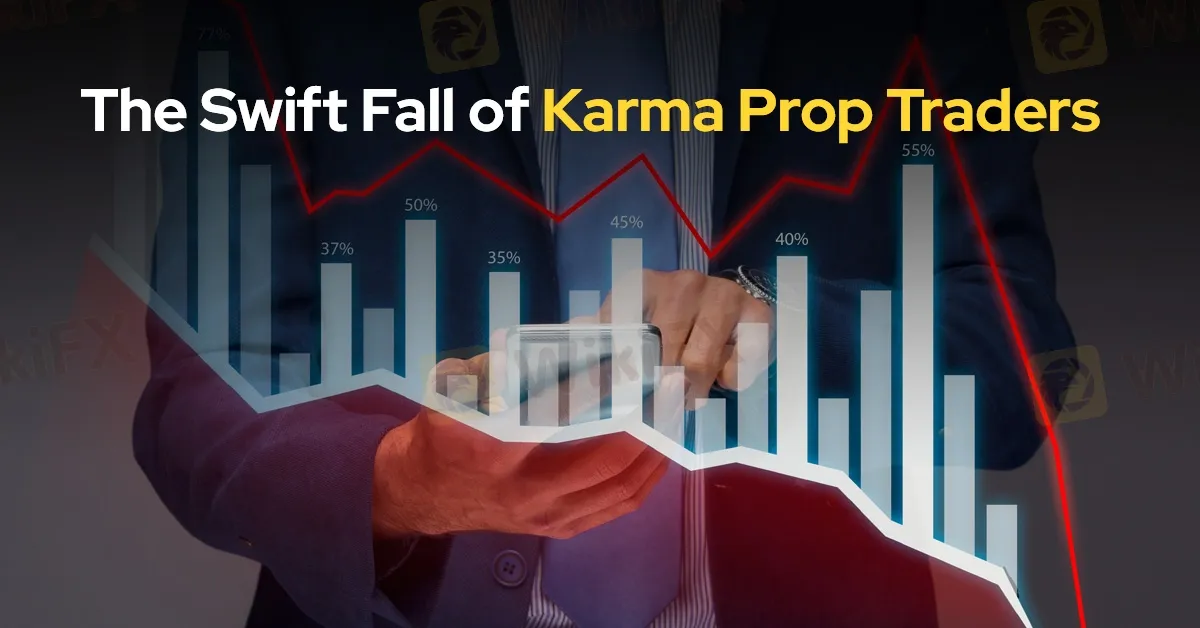The Swift Fall of Karma Prop Traders
Abstract:The rapid demise of Karma, a prop trading firm that collapsed just weeks after significant updates, underscores the challenges and fundamental flaws within the proprietary trading industry, highlighting a broader trend of closures and sustainability issues.

In a dramatic turn of events, prop trading firm Karma has announced its abrupt cessation of operations, just a week after launching a new trading platform and several significant updates. The company's founder, Eshan Balapatabendi, has publicly stated that while he started Karma with “good intentions,” unforeseen challenges rendered the business “unsustainable.”

Karma's rise and fall in the trading world was extraordinarily rapid. Despite receiving favorable reviews, the firms existence was short-lived, spanning only two months. The company's recent developments included a partnership with Match-Trade Technologies, aimed at integrating the Match-Trader platform with TradingView. Additionally, Karma had introduced five major updates that were either in progress or slated for the near future. The sudden decision to halt operations comes as a surprise, given these recent advancements.
Balapatabendi reflected on the firm's closure, explaining that the company was hindered by several obstacles. One significant issue was the failure of a promised technological solution from an unnamed provider, which led to a substantial financial drain over four months. Furthermore, Karmas initial launch revealed critical flaws in their risk management checks. This oversight allowed traders who should have been filtered out during Phase 1 and Phase 2 to pass through, including potential fraudsters. Consequently, these issues contributed to severe cash flow problems and left the company facing liquidity challenges.

Efforts were reportedly made to find external buyers interested in acquiring Karma, but the founder chose to decline these offers. Currently, there are ongoing efforts to ensure that traders who earned profits legitimately will receive their due payouts.
Karma's sudden closure is not an isolated incident. The prop trading industry has witnessed several high-profile closures recently. For instance, Funded Engineer ceased operations in mid-July despite attempts at strategic restructuring. Similarly, True Forex Funds and SI World also exited the market earlier this year.
Industry observers suggest that more than 50 proprietary trading firms might have vanished from the market in 2024 alone. Alex Zanutto of FunderPro attributes these closures to fundamental flaws in the traditional prop trading model. According to Zanutto, many firms operate under a virtual trading system where traders' trades do not reach the real market, resulting in no actual profits. Additionally, some firms might manipulate market conditions to ensure traders fail their challenges, with payouts primarily sourced from challenge fees rather than genuine trading profits.
Zanutto criticized the industrys prevalent “sell as much as you can” strategy, which often includes promises of easy money. He emphasized that trading requires significant effort and time to master, and not every aspiring trader is suited for funded trading opportunities. Just as not everyone can qualify for the Olympics, not everyone is meant to succeed in the prop trading sphere.
As the prop trading industry continues to face these challenges, the rise and fall of Karma serve as a stark reminder of the complexities and risks inherent in this sector.

Read more

FunderPro Integrates cTrader for Enhanced Prop Trading Options
FunderPro now offers the cTrader platform, a favored choice among prop firms, to expand trading options for users with seamless integrations and a robust liquidity network.

Robinhood Rolls Out 2024 Presidential Election Trading Contracts
Robinhood launches event contracts for the 2024 U.S. presidential election, enabling users to trade based on predictions. Eligibility requirements apply.

Is Day Trading a Gamble? Understanding the Key Differences
Discover if day trading is truly a gamble. Learn key differences between trading and gambling, and explore strategies to succeed in the fast-paced trading world.

Interactive Brokers Opens New Office in Dubai DIFC
Interactive Brokers opens a new office in Dubai DIFC, offering advanced global trading platforms to investors in the Middle East, and enhancing access to international financial markets.
WikiFX Broker
Latest News
Is WesternFX a Reliable Broker?
ThinkMarkets Expands Mobile Integration with TradingView
Binance Ordered to Unmask Account Holder in €186,000 Crypto ‘Pig Butchering’ Scam
Will Trump’s Second Term Drive Economic Growth Through Tax Cuts?
InstaForex Lucky Trader Contest
What Happens if A Broker Goes Bust?
Why Do Experienced Traders Care About Forex Spreads?
ATFX Expands LATAM Presence with New Mexico Office
CySEC Warns against Public Review Websites
Former Alameda Executives Hand Over Assets in FTX Creditor Recovery Effort
Rate Calc
